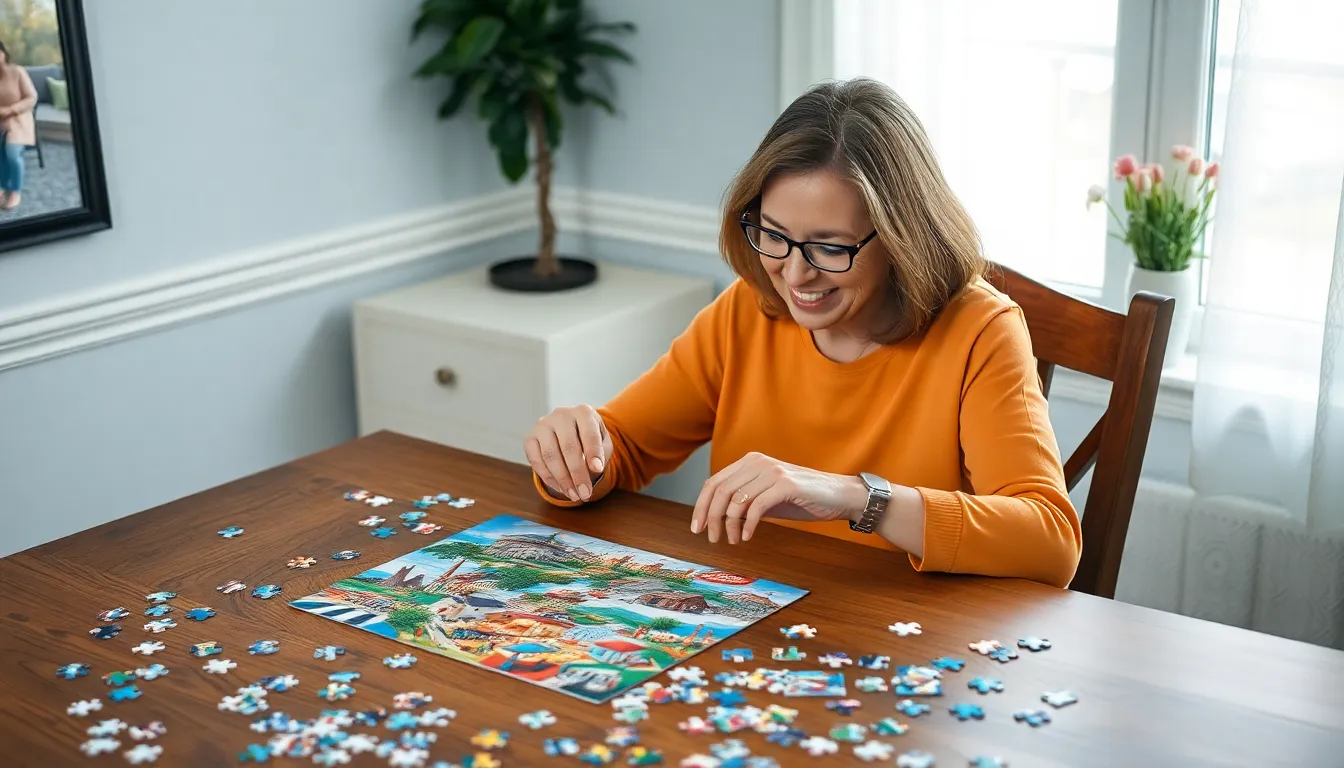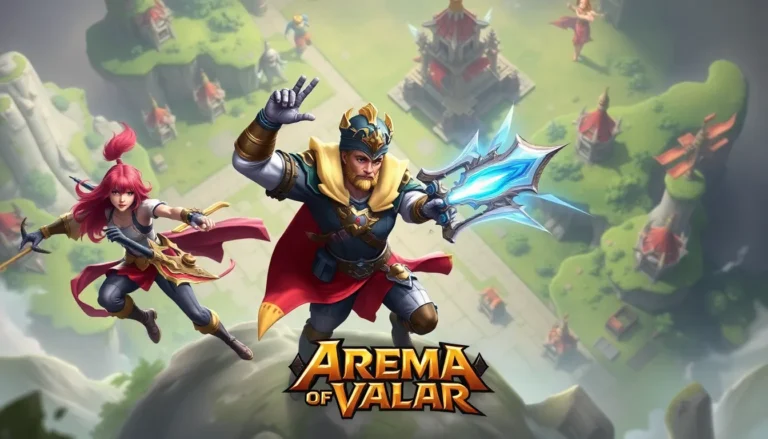Puzzle games have captivated minds for generations, offering a unique blend of challenge and entertainment. From classic jigsaw puzzles to modern brain teasers, these games engage players in a fun way while sharpening their problem-solving skills. Whether played solo or with friends, puzzle games provide an excellent opportunity to unwind and stimulate the brain.
In today’s fast-paced digital world, the appeal of puzzle games has only grown. They come in various forms, including mobile apps and online platforms, making them easily accessible for anyone seeking a mental workout. Players can immerse themselves in intricate challenges that not only entertain but also enhance cognitive abilities. Embracing puzzle games can lead to improved focus, memory, and critical thinking, making them a worthwhile addition to anyone’s leisure time.
Table of Contents
ToggleBenefits of Playing Puzzle Games
Puzzle games offer numerous advantages, particularly in cognitive development and mental well-being. Engaging regularly with these games enhances various skills while providing a much-needed escape from daily stressors.
Cognitive Skills Development
Cognitive skills improvement occurs through regular engagement with puzzle games. These games challenge players to think critically and solve problems, which sharpens reasoning abilities. Increased pattern recognition promotes quicker decision-making, while enhanced memory aids in retaining learned information. Many studies demonstrate that participants who engage in puzzles exhibit greater intellectual flexibility and improved spatial awareness, crucial for problem-solving across various disciplines.
Stress Relief and Relaxation
Puzzle games serve as effective tools for stress relief and relaxation. They encourage players to focus on specific tasks, fostering mindfulness and reducing anxiety levels. Immersing oneself in puzzles can provide a mental respite from daily pressures, creating a calming effect. Evidence suggests that players feel more relaxed and rejuvenated after short gaming sessions, contributing to overall mental well-being.
Types of Puzzle Games

Various types of puzzle games cater to different preferences and skill levels. Each type offers unique challenges and rewards.
Jigsaw Puzzles
Jigsaw puzzles involve piecing together irregularly shaped interlocking pieces to form a complete image. They come in varying difficulties, from simple 100-piece designs to complex 5,000-piece masterpieces. Engaging with jigsaw puzzles can enhance spatial awareness, attention to detail, and patience. They foster a sense of accomplishment upon completion, proving essential for relaxation and mental stimulation.
Crossword Puzzles
Crossword puzzles consist of a grid filled with clues, where players fill in words horizontally and vertically. These puzzles vary in theme and difficulty, appealing to both casual players and seasoned solvers. Regularly engaging in crossword puzzles strengthens vocabulary, enhances general knowledge, and improves pattern recognition. They also provide an enjoyable way to challenge the brain and promote cognitive health.
Logic Puzzles
Logic puzzles require players to solve problems using deductive reasoning and critical thinking. Common examples include Sudoku and riddles, which often involve numbers or combinations of clues. These puzzles demand analytical skills and the ability to recognize patterns. Solving logic puzzles promotes mental sharpness, boosts problem-solving abilities, and can improve overall cognitive function.
How to Get Started with Puzzle Games
Getting started with puzzle games requires selecting the right type and understanding the basics. Here’s how to dive into the world of puzzles effectively.
Choosing the Right Game
- Identify preferences: Determine whether one enjoys logic puzzles, word games, or visual challenges.
- Consider skill level: Choose beginner-friendly games for beginners; more complex games cater to experienced players.
- Explore platforms: Select games available on mobile apps or online websites that match preference and convenience.
- Read reviews: Look for user feedback and ratings to gauge game quality and engagement.
- Test variety: Experiment with different types of puzzles to discover what captivates interest the most.
Tips for Beginners
- Start small: Begin with simpler puzzles to build confidence before tackling more difficult ones.
- Set a time limit: Allocate specific time blocks for gaming sessions to enhance focus and avoid frustration.
- Practice regularly: Engage in daily puzzle-solving to improve skills and speed over time.
- Join communities: Participate in online forums or local groups to exchange tips and motivation.
- Stay patient: Approach challenging puzzles with a calm mindset; perseverance often leads to breakthroughs.
Popular Puzzle Games
Puzzle games offer a diverse array of challenges, appealing to various tastes and preferences. This section explores a selection of both classic and modern puzzle games that captivate players worldwide.
Classic Choices
Classic puzzle games emphasize timeless gameplay that has persisted through generations. Some prominent examples include:
- Jigsaw Puzzles: Players assemble pieces to form a picture, enhancing spatial reasoning and patience.
- Crossword Puzzles: These word-based puzzles challenge vocabulary and critical thinking, requiring players to fill in words based on given clues.
- Sudoku: A number-placement game that enhances logical reasoning, requiring players to fill a grid while adhering to specific rules.
- Sliding Puzzles: Players shift tiles to arrange them in a specific order, boosting problem-solving skills and spatial awareness.
These classic choices remain popular due to their accessibility and the cognitive benefits they provide.
Modern Innovations
Modern puzzle games introduce innovative mechanics, often integrating technology to enhance interactivity. Key examples include:
- Mobile Puzzle Apps: Games like “Candy Crush Saga” and “Two Dots” offer addictive gameplay with vibrant graphics, playable on smartphones and tablets.
- Escape Room Games: These immersive experiences challenge players to solve a series of puzzles within a set time frame to “escape” a themed environment.
- Match-3 Games: Players match three or more items to clear them from the board, focusing on strategy and quick thinking, often featuring appealing narratives.
- Virtual Reality Puzzles: Titles like “The Room VR” enable players to experience detailed, 3D environments, requiring physical engagement and innovative problem-solving.
These modern innovations broaden the appeal of puzzle games, making them engaging for new generations of players.
Puzzle games offer a unique blend of challenge and enjoyment that appeals to a wide audience. Their ability to enhance cognitive skills while providing relaxation makes them an ideal choice for anyone looking to unwind or stimulate their mind. With a variety of options available, from traditional jigsaw puzzles to innovative mobile apps, there’s something for everyone.
Engaging regularly with these games not only boosts mental agility but also promotes a sense of achievement and well-being. As players navigate through different challenges, they cultivate patience and perseverance. Embracing puzzle games can lead to a fulfilling hobby that enriches both leisure time and cognitive development.








